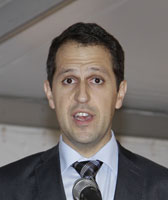
Most concerning is that of the 1,034,762 Grade 10 learners in 2010, only 623,897 made it through to Grade 12 in 2012. Of the 623,897 learners, 461,060 obtained their National Senior Certificate, while only 165,957 received university endorsement, with a significantly lower number actually enrolling for any form of higher education in 2013.
Of those that do enrol in public universities, only 15% to 20% will actually graduate according to the Department of Higher Education and Training's first annual statistical report. This means that SA will not be able to fill the skills shortage gap for a number of years, with serious repercussions for the country's economic growth.
Enrico Jacobs, the vice-chancellor of Belgium Campus, a private higher education institution specialising in IT education, believes that South Africa's growing economy and its opportunities for the future require graduates that are radically different to what our schools and universities are producing.
"South Africa has a high unemployment rate among its youth population, many of which may have a tertiary qualification that does not suit the needs of the workplace, industry or region. The reality is that there is a high demand for a small group of individuals with the right skill sets, while a much larger group of young people languish in the despair of unemployment because their skills and the demands of the industry and regional economies are misaligned," said Jacobs.
To address the issue of matching the right skills to the actual demands of the economy and region, Belgium Campus developed a new pedagogical model that has the needs of various stakeholders in mind, known as the Participative Development Model. It represents both a mindset and a culture within the Belgium Campus, bringing together the needs of the most important stakeholders: students, academia, business, the region, and government.
The Participative Model is designed on the premise that in order for our educational institutions to deliver graduates that are immediately employable and that serve the needs of business and our economy, we need to create a collaborative platform between the key role players that breaks through the ivory tower mentality that persists between business, academic institutions and government.
The Participative Development model takes all stakeholders into account:
"The key factor when developing our curriculum is the employability of our graduates and, in turn, their ability to add value immediately in the business context. In order to achieve this, there needs to be close co-operation with business.
The end result is a qualified individual who complements the work environment, possesses more than just theoretical knowledge, but soft skills and business skills that are a quintessential part of a graduate that adds value from day one.
At Belgium Campus we achieve this by incorporating practical exercises, assignments and projects into the curriculum that are true representations of tasks and challenge experienced by our business partners who are heavily involved with the development of our curriculum," explained Jacobs.